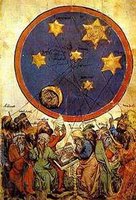
For 5,000 years astrologers worked with the same seven planets (Mercury through Saturn – now known as the “inner planets.” The discovery of Uranus in 1781, followed by Neptune in 1846 and Pluto in 1930 changed astrology forever by introducing the concept of “transpersonal” planets. Where the inner planets rule issues of personality and individuality, the outer planets rule issues of individual rights and the collective (Uranus), transcendence, mysticism and spirituality (Neptune) and death and transformation (Pluto). Chiron’s discovery in 1977 added another layer of complexity to the astrological framework when it was determined to rule the process of healing.
The discovery of each planet occurred during a period of intense change. Uranus’s discovery coincided with a revolutionary fervor that created the United States, arguably changing the course of the planet forever, as well as revolutions in France and Russia and the Industrial revolution. Neptune’s discovery coincided with a rise of mysticism and a worldwide interest in spiritism, as well as Helena Blavatsky and the theosophical movement. Pluto was discovered four months after the crash of the stock market and its discovery was followed shortly by the birth of psychology under the guidance of Sigmund Freud, the rise of Hitler and Nazism, and the birth of the atom bomb. Chiron’s discovery in 1977 coincided with the rise of alternative healing practices and the concept of the mind-body connection.
Yesterday scientists revealed that a new planet, UB313 (temporarily named “Xena”), is larger than Pluto and therefore a strong candidate to be considered the tenth planet in the solar system. Sedna and Quaoar, both recently discovered planet-like objects past Pluto, have not been accepted into “planethood” by either the scientific or astrology communities. (It should be mentioned, however, that the scientific community still is divided on the significance of Chiron whose influence has proven to be powerful for astrologers.)
What will this new planet bring to the astrological pantheon and the expanding human consciousness? Once the planet is named, astrologers will begin to delve into the symbolism that amazingly and synchronistically connects the names of the planets to their astrological function. Star IQ has an interesting article about how astrology connects with the discovery of new planets. There’s little doubt that humanity is on the verge of a major shift, and perhaps this new planet will offer a clue to our new direction.

